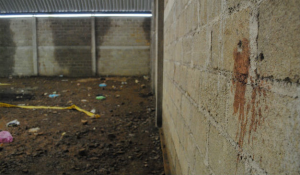
11/30/14 (written by cmolzahn) — The Mexican Army (Secretaría de Defensa Nacional, Sedena) announced that it would accept and implement recommendations issued by the National Human Rights Commission (Comisión Nacional de los Dererechos Humanos, CNDH) regarding the massacre of 22 suspected kidnappers in Tlatlaya, in the State of Mexico (Estado de México, Edomex), on June 30, despite openly expressing that it does not entirely agree with the commission’s findings. The Tlatlaya incident, along with the disappearance and likely murder of 43 students in Iguala, Guerrero in late September, has led to calls for officials at the highest levels of Mexican governance to take responsibility to begin to restore public confidence in the rule of law.
According to the CNDH, 15 of the 22 individuals killed were shot by members of the Mexican Army despite having surrendered. In one of his last statements as CNDH president, Raúl Plascencia Villanueva affirmed that after repelling an armed attack, the aggressors having surrendered, the military elements entered the warehouse where the incident occurred and in an “arbitrary, disproportional, unnecessary action detached from the system of human rights,” shot dead 12 individuals who had either surrendered or were wounded. Regarding the other three victims, the CNDH said that it was not possible to determine whether their wounds resulted from an exchange of gunfire or whether they were executed, since their bodies had been moved. The fact that they had been tampered with, presumably to give the appearance that they had had been wounded while engaged in an exchange of gunfire, was sufficient for the CNDH to conclude that they were killed extra-judicially. The CNDH finding is consistent with an Associated Press report last month that countered Sedena’s official accounting of the incident, which maintained that all of the 22 dead were killed while engaged in an armed confrontation. Moreover, last month a survivor of the incident—a young woman said to have been kidnapped by the group involved in the shootout with the Army battalion—revealed in an interview granted to a Mexican magazine that the soldiers had engaged in execution-style killings after the gunmen had been disarmed, and had also moved bodies and planted weapons to make it appear as though they had died while engaged in a shootout, and that only one of the gunmen died as a result of the confrontation.
Aside from Sedena, the recommendation from the CNDH was directed to Mexico’s Attorney General’s Office (Procuraduría General de la República, PGR) and the Attorney General’s Office of the State of Mexico (Procuraduría General de Justicia del Estado de México, PGJE). The primary demands were for a thorough investigation to be carried out into the seven members of the Mexican Army implicated in the incident, that federal authorities prosecute them, and that families of the victims be compensated. It also called for strengthening human rights training for all ranks of the Sedena. Indeed, since the beginning of the military-led campaign against Mexican drug cartels in 2006, various human rights organizations have complained of extrajudicial killings and disappearances carried out by members of the Mexican armed forces engaged in civilian policing operations that have not been duly investigated or prosecuted or even officially recognized, in some cases.
National and international media attention to the incident in Tlatlaya has increased public pressure on the Peña Nieto administration to address human rights concerns. On October 31, General Salvador Cienfuegos Zepeda, head of the Sedena, seemed to acknowledge that there were missteps by members of his organization, saying “we cannot combat illegality with illegality; all of our actions must be firm, but reasoned, preserving human rights.” Nevertheless, the agency has yet to acknowledge that Sedena leadership was complicit in covering up the facts of what happened in Tlatlaya. The military prosecutor’s office (Procuraduría General de la República, PGJM) has opened an investigation into the events, although the highest-ranking member of the Army implicated is the lieutenant who was in charge of the battalion that carried out the killings. In September, Sedena announced that it had initiated criminal proceedings against the soldiers involved, but has been quiet since then regarding the matter.
In the meantime, the case has moved to a federal civilian court, according to an announcement on November 2 by the Federal Judiciary Council (Consejo de la Judicatura Federal, CJF). In all, seven soldiers will face charges of acts unfit for public service (ejercicio indebido del servicio público); three of these will face charges of abuse of authority, aggravated murder, and altering the crime scene; and one will face an additional charge of covering up evidence in what will be the highest-profile civil trial of members of the Mexican military accused of committing abuses against civilians since the Mexican government began its military-led campaign in 2006. As for the two women who survived the incident—including the woman who gave the interview countering Sedena’s account—the PGR says they are “innocent” of any wrongdoing, and were victims of kidnapping by the criminal group involved in the confrontation.
Sources:
Aranda, Jesús. “Milicia y Justicia/Desprestigio por casos Tlatlaya y Ayotzinapa.” La Jornada. October 31, 2014. http://www.jornada.unam.mx/ultimas/2014/10/31/milicia-y-justicia-desprestigio-por-casos-tlatlaya-y-ayotzinapa-4439.html
“Un juzgado civil consigna a siete militares por el caso Tlatlaya.” CNN México. November 2, 2014. http://mexico.cnn.com/nacional/2014/11/02/un-juzgado-civil-consigna-a-siete-militares-por-el-caso-tlatlaya
“Tlatlaya: abrir paso a la justicia.” La Jornada. Nov. 13, 2014. http://www.jornada.unam.mx/2014/11/03/edito




